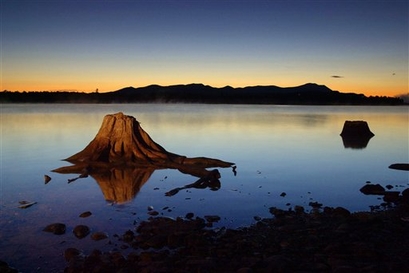 Ecotourism in Thoreau's footsteps
Ecotourism in Thoreau's footsteps
 The first light of dawn silhouettes the Katahdin Range east of Chesuncook Lake, Maine.
The first light of dawn silhouettes the Katahdin Range east of Chesuncook Lake, Maine.By CLARKE CANFIELD, Associated Press WriterMon Jul 23, 2:03 PM ET
Henry David Thoreau made his third and final trip to Maine's North Woods 150 years ago, traveling waterways and forests that shaped so many of his ideas about nature.
A nonprofit group on Monday unveiled what it calls the Thoreau-Wabanaki Trail to pay tribute to Thoreau — whom some consider the first ecotourist — and the Penobscot Indian guides who accompanied him on two of his treks.
Maine Woods Forever has produced a detailed map of Thoreau's trips, and will erect informational kiosks along different parts of Thoreau's route. The group also has worked in partnership with a photographer who is producing a book of photos, "Wildness Within, Wildness Without," retracing Thoreau's steps.
The map is thought to be the first of its kind that tracks each of Thoreau's trips, day by day as he canoed Moosehead Lake, the Penobscot River and its tributaries, and climbed Mount Katahdin. The map gives a broad overview of Thoreau's trips and includes his observations from selected points along the way, but it is not intended as a navigational tool for canoeists and hikers.
The project aims to raise public interest not only in Thoreau's travels, but also in the wilderness spirit and recreational heritage of the North Woods.
"I hope what comes of this is a better understanding of the potential that the North Woods has to offer everyone in the world when it comes right down to it," said Don Hudson, president of the Maine Woods Forever. "If we can achieve that, we can move a step closer to broader awareness of these assets."
Thoreau, an author and philosopher who lived from 1817 to 1862, is well-known today for his reflections on simple living in nature, especially through his book "Walden" about his two-year retreat in a small house on Walden Pond in his hometown of Concord, Mass.
He also wrote "The Maine Woods," a lesser-known book about his observations and thoughts during his three journeys to northern Maine, in 1846, 1853 and 1857.
For its Thoreau project, Maine Woods Forever assembled a committee of people to exchange ideas on what should be done.
Butch Phillips, a Penobscot Indian from Milford, suggested that the trail be named to recognize the Wabanaki Indians — which include the Penobscot, Passamaquoddy, Maliseet, Abanaki and Micmac tribes.
In his last two trips to the North Woods, Thoreau used Penobscot guides Joe Attean and Joe Polie to lead him through the wilds. His routes were part of an ancient canoe trail used by Wabanaki tribes for thousands of years as they traveled the area on its various waterways and connecting portages, he said.
"The trail is going to bring recognition and publicity to a canoe trail that was made popular by Thoreau's writings of his visits to Maine," Phillips said. "It also memorializes Thoreau's Penobscot guides, who played an important role in his travels and his stories."
The trail was unveiled on the final day of the three-day Thoreau-Wabanaki Trail Festival. The festival was being held in Greenville, on the southern end of Moosehead Lake where Thoreau began his third trip exactly 150 years ago after taking a stagecoach from Bangor.
The festival featured exhibits, rides on Moosehead Lake in a birch bark canoe like the one Thoreau paddled, a Thoreau impersonator and a concert with a Maine musician singing Thoreau-inspired songs.
The trail's first kiosk has also just been installed in Greenville, a prototype for eight to 10 others that in time will be placed at other yet-to-be-determined points along Thoreau's route. Two granite sculptures — one of a birch bark canoe, the other of two hawks — have also been unveiled, also in Greenville.
Drawing attention to Thoreau's North Woods' journeys can help draw people to the region for its natural beauty, Hudson said.
"I think everybody knows that the economy of the North Woods is changing," he said. "Yet I think there is a role for nature-based tourism to play in the future of Maine. And I think this is a good example of how we can organize ourselves to essentially show people how wonderful this state is to travel in."
___
If You Go...
THOREAU-WABANAKI TRAIL: http://www.thoreauwabanakitrail.org or 207-882-8439. The Thoreau trail includes portions of the Penobscot River and Moosehead Lake, which Thoreau explored by canoe; along with Mount Katahdin, the state's highest peak and the terminus of the Appalachian Trail. The first kiosk on the trail and two granite sculptures are located in Greenville, where Thoreau began his Moosehead Lake trip.